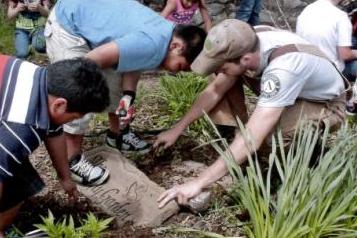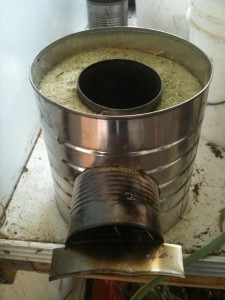From Energy Corps member Rob Moore at Washington County Environmental Affairs:
While much of my job involves khakis and dress shirts, the acceptable wardrobe for work in public schools, I occasionally get a project which demands my preferred attire. I call these ‘overall days’. Leslie Keene, a fourth grade teacher with one of the more rural school districts we work with came to us to revive a dying butterfly garden. And here begins the story of a month of overall days.
Our teachers are plagued with testing for all but the final month of the school year. However, with benchmarks done, opportunities for outdoor education arrive just in time for spring! While we made sure to do in-class lessons with the fourth grade gardening students, to cover recycling and the energy use of waste management, much of our gardening education was void of curriculum. Luckily, with a teacher as knowledgeable as Mrs. Keene, who has been teaching Huntsville fourth graders for almost 30 years (she currently has the daughter of a student she taught), our free flow education worked wonders. It amazes me that many students, even in rural districts, haven’t been given the opportunity to explore the outdoors before. Some of students began convinced they didn’t like dirt, bugs, or the sun.
 In taking on this project, my goal was to teach students about complex systems. When a student pulled a worm out, we gathered around to talk about what they give to our garden. By moving throughout our soil, and doubling in herd size every four months, they loosen soil and provide an increasing amount of “worm tea” (poop, something fourth graders always get a kick out talking about) to add to our soil and increase plant growth. From there we found snakes, a series of grubs, ants, and a woodchuck who serves as head gardener while the kids are away. We gathered around whatever we found to talk about whether we wanted it to be a part of the garden (one of their favorite discoveries was a patch of wild onions). From here, we help the students build a picture of our garden system.
In taking on this project, my goal was to teach students about complex systems. When a student pulled a worm out, we gathered around to talk about what they give to our garden. By moving throughout our soil, and doubling in herd size every four months, they loosen soil and provide an increasing amount of “worm tea” (poop, something fourth graders always get a kick out talking about) to add to our soil and increase plant growth. From there we found snakes, a series of grubs, ants, and a woodchuck who serves as head gardener while the kids are away. We gathered around whatever we found to talk about whether we wanted it to be a part of the garden (one of their favorite discoveries was a patch of wild onions). From here, we help the students build a picture of our garden system.
Once we had a cleared garden we got to move onto plants! We researched which plants would support butterflies, talked about spacing, planting depth, native versus invasive species, and volume to make sure we could produce the best environment. We layered this concept map on top of the understanding of our animal inhabitants. We had a gracious donation of mulch from the local power company which we dug into for a lesson on composting before spreading around our plants just in time to see our first two butterflies; two female Diana Fritillary came to visit a patch of our Indian Feather beginning a season of pollination which we sat outside and watched begin. By this point we had even the most adamant ‘I hate dirt’ students with a thick layer of brown underneath their fingernails as we sat down to talk about the human impact in creating our green space.
 Here’s why I love the opportunity Energy Corps has afforded me. I have been given the flexibility to find unique ways to introduce our youth the ideas of sustainability. Just as if our butterfly garden were the entire world, the struggle is how to manage what we as humans want against a respect for our natural world. We took the agency to decide which plants to pull and which to leave. We decided how to create the energy necessary to cultivate our land. And we decided how to enjoy our space. Over the month it took to bring their garden back into working order, I was blessed to watch students get more and more excited as they put the pieces together. For me, that is what Energy Corps has been about. It is about the ability to find tangible ways to relate complex concepts. It isn’t easy to balance our existence to the world around us in a mutually advantageous way. Realizing that fourth graders have the ability and willingness to understand concepts I have been struggling with for years is incredibly humbling. And now I have 22 essays from 22 new friends reminding me that my generation may be at the precipice of sustainability in Arkansas, but the future is in classrooms full of eight year olds with dirt beneath their nails.
Here’s why I love the opportunity Energy Corps has afforded me. I have been given the flexibility to find unique ways to introduce our youth the ideas of sustainability. Just as if our butterfly garden were the entire world, the struggle is how to manage what we as humans want against a respect for our natural world. We took the agency to decide which plants to pull and which to leave. We decided how to create the energy necessary to cultivate our land. And we decided how to enjoy our space. Over the month it took to bring their garden back into working order, I was blessed to watch students get more and more excited as they put the pieces together. For me, that is what Energy Corps has been about. It is about the ability to find tangible ways to relate complex concepts. It isn’t easy to balance our existence to the world around us in a mutually advantageous way. Realizing that fourth graders have the ability and willingness to understand concepts I have been struggling with for years is incredibly humbling. And now I have 22 essays from 22 new friends reminding me that my generation may be at the precipice of sustainability in Arkansas, but the future is in classrooms full of eight year olds with dirt beneath their nails.
Rob is from Army bases nationwide and has spent his time post college doing his best to live the life of a sustainable vagabond. He has worked in sustainable agriculture and education with Heifer International in Arkansas, has done green construction in Florida, and took a winter off to snowboard in California. He graduated from Rollins with a B.A. in philosophy and religion and is looking forward to starting a part time masters in philosophy at the University of Arkansas in the spring.









